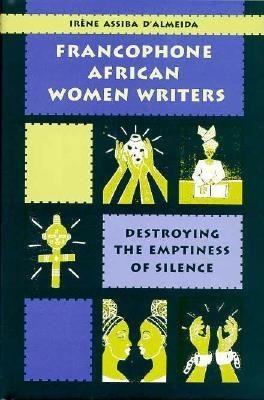
- We will send in 10–14 business days.
- Author: Irene Assiba D'Almeida
- Publisher: University Press of Florida
- ISBN-10: 081301302X
- ISBN-13: 9780813013022
- Format: 16 x 23.5 x 2 cm, kieti viršeliai
- Language: English
- SAVE -10% with code: EXTRA
Reviews
Description
French-speaking African women traditionally expressed their creativity through oral storytelling. Previously silent in print, today they also speak through the written word, and their stories constitute one of the most significant recent developments in African literature. Irene Assiba d'Almeida dates this emerging phenomenon to 1969, the year Kuoh-Moukouri's Rencontres essentielles was published. A few more books by women were published in the '70s, followed by a creative explosion in the '80s that d'Almeida describes as a militant feminist appropriation of the written word. D'Almeida's book, the first single-author critical study in English of literary expression by Francophone African women, examines novels and autobiographies by nine new and established writers, all published since 1975. She finds that writing has liberated Francophone African women. They use it to critique the patriarchal order, to champion the cause of women and the community, and to preserve positive aspects of tradition. D'Almeida divides her analysis into sections on three aspects of literary production. The first deals with autobiography and begins with A Dakar Childhood, by Nafissatou Diallo, the first Francophone African woman to write her own life history. The section also examines The Abandoned Baobab, by Ken Bugul, a book that broke sexual taboos, and My Country, Africa, by Andree Blouin. In the second section the author looks at women and the family, including problems related to "compulsory" motherhood. She discusses Your Name Will Be Tanga, by Calixthe Beyala, Cries and Fury of Women, by Angele Rawiri (both published only in French), and Scarlet Song, by Mariama Ba. The third section, "W/Riting Change: Women as Social Critics", discusses the ways female novelists link problems that affect women's lives to those affecting society at large. It examines works in French by Werewere Liking, Aminata Sow Fall, and Veronique Tadjo.
EXTRA 10 % discount with code: EXTRA
The promotion ends in 21d.07:00:38
The discount code is valid when purchasing from 10 €. Discounts do not stack.
- Author: Irene Assiba D'Almeida
- Publisher: University Press of Florida
- ISBN-10: 081301302X
- ISBN-13: 9780813013022
- Format: 16 x 23.5 x 2 cm, kieti viršeliai
- Language: English English
French-speaking African women traditionally expressed their creativity through oral storytelling. Previously silent in print, today they also speak through the written word, and their stories constitute one of the most significant recent developments in African literature. Irene Assiba d'Almeida dates this emerging phenomenon to 1969, the year Kuoh-Moukouri's Rencontres essentielles was published. A few more books by women were published in the '70s, followed by a creative explosion in the '80s that d'Almeida describes as a militant feminist appropriation of the written word. D'Almeida's book, the first single-author critical study in English of literary expression by Francophone African women, examines novels and autobiographies by nine new and established writers, all published since 1975. She finds that writing has liberated Francophone African women. They use it to critique the patriarchal order, to champion the cause of women and the community, and to preserve positive aspects of tradition. D'Almeida divides her analysis into sections on three aspects of literary production. The first deals with autobiography and begins with A Dakar Childhood, by Nafissatou Diallo, the first Francophone African woman to write her own life history. The section also examines The Abandoned Baobab, by Ken Bugul, a book that broke sexual taboos, and My Country, Africa, by Andree Blouin. In the second section the author looks at women and the family, including problems related to "compulsory" motherhood. She discusses Your Name Will Be Tanga, by Calixthe Beyala, Cries and Fury of Women, by Angele Rawiri (both published only in French), and Scarlet Song, by Mariama Ba. The third section, "W/Riting Change: Women as Social Critics", discusses the ways female novelists link problems that affect women's lives to those affecting society at large. It examines works in French by Werewere Liking, Aminata Sow Fall, and Veronique Tadjo.


Reviews